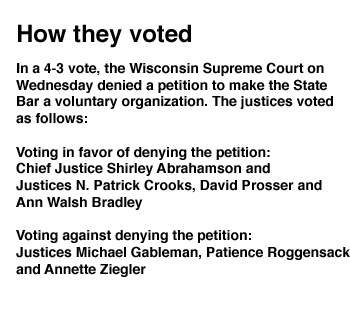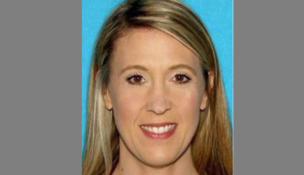State Supreme Court denies voluntary bar petition
By: Jack Zemlicka, [email protected]//June 1, 2011//
State Supreme Court denies voluntary bar petition
By: Jack Zemlicka, [email protected]//June 1, 2011//

The push to abolish the mandatory State Bar suffered a setback Wednesday when the Wisconsin Supreme Court denied a petition to make the organization voluntary.
By a 4-3 vote, the court decided that the proposal submitted Feb. 11 by attorneys Steve Levine and Jim Thiel lacked enough detail to warrant a public hearing.
“Where are we going on this?” asked Justice Ann Walsh Bradley of the purpose of the petition, which did not include any financial or administrative specifics as to how the bar would function as a voluntary entity.
Several members of the court said they did not want to proceed with any proposal to change the membership status of the bar before knowing what the ramifications would be.
The court made it clear the petitioners could re-file, but the petition would need to be more detailed.
The only request made in the denied petition was that the court “amend, repeal or recreate” the Supreme Court Rules that govern the structure of the bar to make it voluntary.
 In an interview after Wednesday’s denial, Levine said the petition was intentionally broad to allow the court to devise a structure for a voluntary bar.
In an interview after Wednesday’s denial, Levine said the petition was intentionally broad to allow the court to devise a structure for a voluntary bar.
“Obviously, this is something it appears the court does not want to look at,” he said. “The problem is for a voluntary bar, there are a number of different directions it could go.”
He said it is up to the court to determine how it would implement a voluntary bar, since they are currently responsible for regulating the profession.
But Court Commissioner Julie Rich said that is not a task she or the court is willing to take on.
“The court needs a framework to start the conversation,” she said. “If the petitioners want to put something more detailed together, the court will be open to considering it.”
Levine said he is mulling a revised petition, which would require extensive research into the financial impact of moving toward a voluntary bar, something both he and the court acknowledged would be a massive undertaking.
Justice Patience Roggensack, who voted in the minority on Wednesday, said the petitioners ought to have the chance to bring the issue back to court.
“I’d like to listen to them and have them tell me why this is a good idea,” she said. “I know the idea of a voluntary bar is a deeply held view, however, I don’t think the court should be doing the work of the folks filing the petition.”
But even if an amended petition comes to the court, it may have little chance of success.
Both Bradley and Justice David Prosser said Wednesday they favor a mandatory bar, and other members of the court questioned whether much has changed in the profession since the last time the court addressed the issue in the early ’90s.
“I favor an integrated bar, period,” Prosser said.
Thirty-two years after the bar was first made mandatory, a federal district court declared the mandate unconstitutional in 1988. That decision was overturned in 1992, and the Wisconsin Supreme Court reinstated the mandatory bar, with the lone dissent coming from Chief Justice Shirley Abrahamson.
“Since that time I dissented, I don’t think very much, if anything, has changed,” she said Wednesday. “Many people are divided on the bar.”
If a proposal does come back to the court, Abrahamson said she would prefer a resolution to the issue.
“We can vote up or down on it so we don’t waste a lot of people’s time,” she said.
Jack Zemlicka can be reached at [email protected].
Legal News
- Milwaukee’s Common Council now has the most African Americans, women and openly LGBTQ members ever
- Office of School Safety Provides Behavioral and Threat Assessment Management Training Ahead of 25th Anniversary of Columbine Shooting
- Wisconsin Supreme Court to hear arguments in Democratic governor’s suit against GOP-led Legislature
- Lawsuit asks Wisconsin Supreme Court to strike down governor’s 400-year veto
- Wisconsin man pleads not guilty to neglect in disappearance of boy
- ACS Selects University of Wisconsin Law School’s Miriam Seifter for 2024 Ruth Bader Ginsburg Scholar Award
- People with disabilities sue in Wisconsin over lack of electronic absentee ballots
- Wisconsin Republicans ignore governor’s call to spend $125M to combat ‘forever chemicals’
- Native American voices are finally factoring into energy projects
- Steven Avery prosecutor Ken Kratz admits ‘mistakes were made’
- Colombian national extradited to Milwaukee faces International narcotics-trafficking conspiracy charge
- MPD: Milwaukee homicides down nearly 40 percent compared to last year
WLJ People
- Power 30 Personal Injury Attorneys – Russell Nicolet
- Power 30 Personal Injury Attorneys – Benjamin Nicolet
- Power 30 Personal Injury Attorneys – Dustin T. Woehl
- Power 30 Personal Injury Attorneys – Katherine Metzger
- Power 30 Personal Injury Attorneys – Joseph Ryan
- Power 30 Personal Injury Attorneys – James M. Ryan
- Power 30 Personal Injury Attorneys – Dana Wachs
- Power 30 Personal Injury Attorneys – Mark L. Thomsen
- Power 30 Personal Injury Attorneys – Matthew Lein
- Power 30 Personal Injury Attorneys – Jeffrey A. Pitman
- Power 30 Personal Injury Attorneys – William Pemberton
- Power 30 Personal Injury Attorneys – Howard S. Sicula











